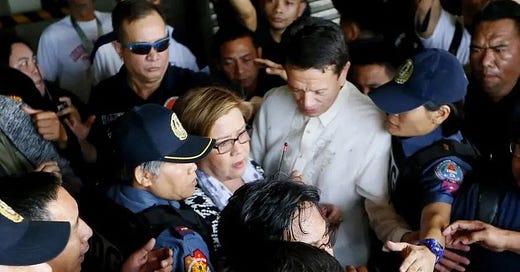Philippines’ ‘Prisoner of Conscience’ Bailed
Leila De Lima gains freedom after almost seven years in lockup
By: Viswa Nathan
President Ferdinand Marcos Jr., as much as anyone else, must have heaved a sigh of relief when Muntinlupa Regional Trial Court judge Gener Gito reversed an earlier ruling and released this week the Philippines’ prisoner of conscience, Leila De Lima, on a nominal bail. Her continued incarceration had become a thorn in the side of the Marcos administration, particularly for its foreign relations and trade.
De Lima had been arrested and held in custody since February 2017 on the orders of Marcos’s predecessor, Rodrigo Duterte, for what is widely considered a personal vendetta. As the former chairperson of the Philippine Human Rights Commission (later secretary of justice and a senator), De Lima had investigated what is called Duterte’s “Davao Death Squad” while he was mayor of the southern city of Davao. She also opposed the wanton killings he ordered the police to carry out to eradicate the distribution of dangerous drugs in the country, but without success.
To Duterte's chagrin, three of the witnesses the prosecution chose to convict De Lima recanted their testimonies as his presidency neared its end. One of them said Duterte’s justice secretary, Vitaliano Aguirre coerced him “to admit something that did not happen.” Another pleaded that he was “coerced, pressured, intimidated, and seriously threatened by the police” to testify against De Lima, and the third confessed that the chairman of the House of Congress justice committee, the late Reynaldo Umali, asked him to lie about receiving drug money for De Lima.
Still, the Duterte camp was confident of keeping De Lima locked up indefinitely. A fortnight before Marcos took office, the then-justice secretary, Menardo Guevarra, who was leaving with Duterte, indicated the retiring president’s mindset. He said the charges against De Lima would not be dropped just because some witnesses had recanted. It seemed to suggest there was an understanding between the departing and incoming presidents on how to treat De Lima. Judge Gito’s ruling this week must have disappointed Guevarra and Duterte.
Apparently, Marcos yielded to pressure from the Duterte camp that helped him rise to power, feared that releasing De Lima from custody could put his administration in a wobbly state. So, reminiscent of Pontius Pilate washing his hands after ordering the execution of Jesus, Marcos said, soon after assuming office, that exercising his executive authority to order the Justice Department to dismiss the charges would be “interfering” with the judicial process in motion. Some in the legal circle saw it as a copout. “The president wouldn’t dare act on such an issue, which is too sensitive to his powerful predecessor and ally,” said one of them.
However, on her release, which she called a “moment of triumph,” De Lima said Marcos ad respected “the independence of the judiciary and the rule of law” for which she thanked the Marcos administration.
De Lima remained an uncompromising fighter for probity and accountability throughout her public service. Duterte was not the only power-holder she called out for accountability. She also prosecuted others, including former president Gloria Macapagal-Arroyo, for misuse of development funds and electoral misconduct. But Duterte was the only powerholder who launched a no-holds-barred reprisal to destroy her reputation in every possible way.
About the accusation leveled against her, De Lima had said that she was willing “to be shot in front of Duterte if the drug allegations against her are proven true.” And as Judge Juanita Guerrero of the Muntinlupa Regional Trial Court, Branch 204, issued the arrest order without hearing a motion to quash the petition, De Lima said: “It’s my honor to be jailed for the principles I am fighting for.”
This week, as she stepped out into freedom, after enduring that painful honor for almost seven years, De Lima said: “For years, my whole being has been crying out for justice and freedom,” and there was jubilation beyond the borders of the Philippines for the freedom of this prisoner of conscience. The European Parliament and human rights experts worldwide have long called for her release. Reacting to De Lima’s release, the European Union’s ambassador to the Philippines, Luc Veron, tweeted that he was “very pleased by the news.” The deputy director of Human Rights Watch in Asia, Bryony Lau, said De Lima never should have been prosecuted and detained.
“We are appalled that it has taken so long for Sen. De Lima to regain her freedom, given that she never should have been detained in the first place,” said Charles Santiago, the co-chair of Asian Parliamentarians for Human Rights. “We also note that while she has been granted bail, she is still awaiting trial for the last remaining drug case against her. Sen. De Lima’s acquittal in the other two drug cases, as well as the recantation of numerous supposed witnesses over the years, demonstrate the baselessness of the accusations against her. We urge authorities in the Philippines to drop all remaining charges and grant her unconditional freedom.”
In 2017, Time magazine named De Lima one of the world’s 100 Most Influential People, notably in the category of “speaking truth to power.” Amnesty International awarded her the Most Distinguished Human Rights Defender the following year.




Writing this article all the way from North America? There's more than meets the eye with this harridan. But the world will never understand this formula of corruption mixed with selfishness.
The man who locked her up may be a tyrant but he had his reasons. Using the system to play the victim was always on her cards.
🙏🏾🙏🏾🙏🏾